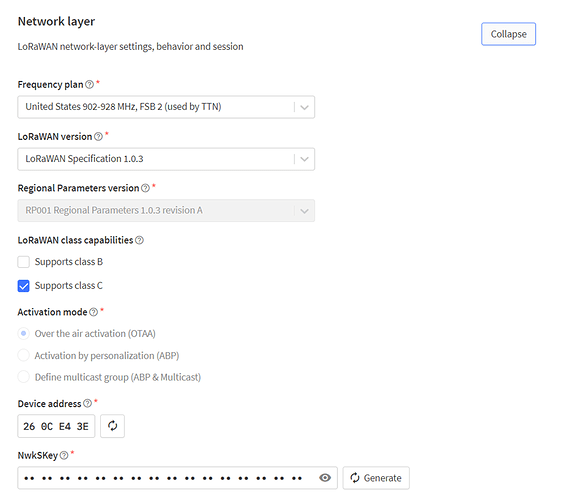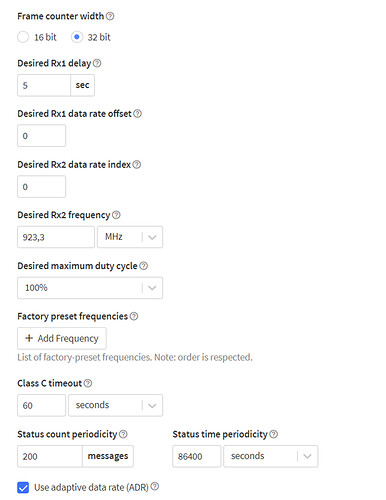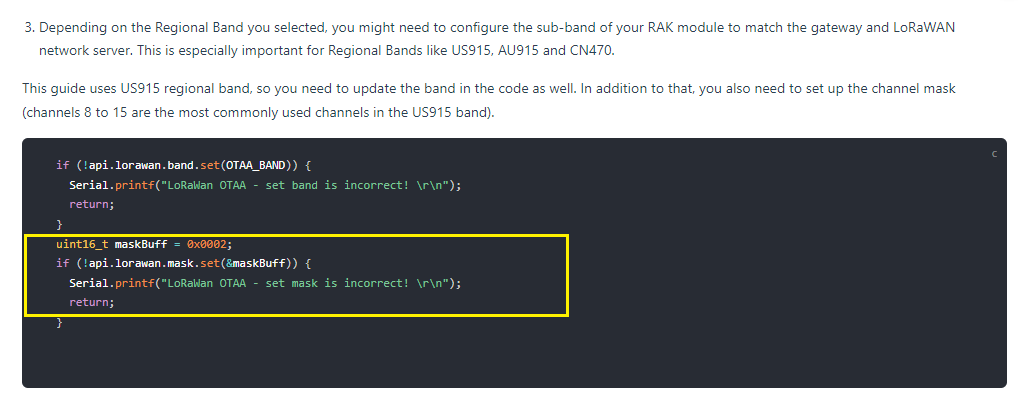Hello @Dacsystems ,
This RAK3172 guide is not online yet.
The complete sketch
Blockquote
#define OTAA_PERIOD (20000)
/*************************************
LoRaWAN band setting:
RAK_REGION_EU433
RAK_REGION_CN470
RAK_REGION_RU864
RAK_REGION_IN865
RAK_REGION_EU868
RAK_REGION_US915
RAK_REGION_AU915
RAK_REGION_KR920
RAK_REGION_AS923
*************************************/
#define OTAA_BAND (RAK_REGION_US915)
#define OTAA_DEVEUI {0x70, 0xB3, 0xD5, 0x7E, 0xD0, 0x04, 0xF1, 0xC0}
#define OTAA_APPEUI {0x70, 0xB3, 0xD5, 0x7E, 0xD0,0x03, 0xAB, 0xA2}
#define OTAA_APPKEY {0xB4, 0x85, 0x7E, 0xFE, 0x1C, 0xB5, 0x15, 0xEB, 0x44, 0x61, 0x0D, 0x9B, 0x20, 0x6A, 0xF3, 0x3A}
/** Packet buffer for sending */
uint8_t collected_data[64] = { 0 };
void recvCallback(SERVICE_LORA_RECEIVE_T * data)
{
if (data->BufferSize > 0) {
Serial.println(“Something received!”);
for (int i = 0; i < data->BufferSize; i++) {
Serial.printf(“%x”, data->Buffer[i]);
}
Serial.print(“\r\n”);
}
}
void joinCallback(int32_t status)
{
Serial.printf(“Join status: %d\r\n”, status);
}
void sendCallback(int32_t status)
{
if (status == 0) {
Serial.println(“Successfully sent”);
} else {
Serial.println(“Sending failed”);
}
}
void setup()
{
Serial.begin(115200, RAK_AT_MODE);
Serial.println(“RAKwireless LoRaWan OTAA Example”);
Serial.println(“------------------------------------------------------”);
// OTAA Device EUI MSB first
uint8_t node_device_eui[8] = OTAA_DEVEUI;
// OTAA Application EUI MSB first
uint8_t node_app_eui[8] = OTAA_APPEUI;
// OTAA Application Key MSB first
uint8_t node_app_key[16] = OTAA_APPKEY;
if (!api.lorawan.appeui.set(node_app_eui, 8)) {
Serial.printf(“LoRaWan OTAA - set application EUI is incorrect! \r\n”);
return;
}
if (!api.lorawan.appkey.set(node_app_key, 16)) {
Serial.printf(“LoRaWan OTAA - set application key is incorrect! \r\n”);
return;
}
if (!api.lorawan.deui.set(node_device_eui, 8)) {
Serial.printf(“LoRaWan OTAA - set device EUI is incorrect! \r\n”);
return;
}
if (!api.lorawan.band.set(OTAA_BAND)) {
Serial.printf(“LoRaWan OTAA - set band is incorrect! \r\n”);
return;
}
uint16_t maskBuff = 0x0002;
if (!api.lorawan.mask.set(&maskBuff)) {
Serial.printf(“LoRaWan OTAA - set mask is incorrect! \r\n”);
return;
}
if (!api.lorawan.deviceClass.set(RAK_LORA_CLASS_A)) {
Serial.printf(“LoRaWan OTAA - set device class is incorrect! \r\n”);
return;
}
if (!api.lorawan.njm.set(RAK_LORA_OTAA)) // Set the network join mode to OTAA
{
Serial.printf
(“LoRaWan OTAA - set network join mode is incorrect! \r\n”);
return;
}
if (!api.lorawan.join()) // Join to Gateway
{
Serial.printf(“LoRaWan OTAA - join fail! \r\n”);
return;
}
/** Wait for Join success */
while (api.lorawan.njs.get() == 0) {
Serial.print(“Wait for LoRaWAN join…”);
api.lorawan.join();
delay(10000);
}
if (!api.lorawan.adr.set(true)) {
Serial.printf
(“LoRaWan OTAA - set adaptive data rate is incorrect! \r\n”);
return;
}
if (!api.lorawan.rety.set(1)) {
Serial.printf(“LoRaWan OTAA - set retry times is incorrect! \r\n”);
return;
}
if (!api.lorawan.cfm.set(1)) {
Serial.printf(“LoRaWan OTAA - set confirm mode is incorrect! \r\n”);
return;
}
/** Check LoRaWan Status*/
Serial.printf(“Duty cycle is %s\r\n”, api.lorawan.dcs.get()? “ON” : “OFF”); // Check Duty Cycle status
Serial.printf(“Packet is %s\r\n”, api.lorawan.cfm.get()? “CONFIRMED” : “UNCONFIRMED”); // Check Confirm status
uint8_t assigned_dev_addr[4] = { 0 };
api.lorawan.daddr.get(assigned_dev_addr, 4);
Serial.printf(“Device Address is %02X%02X%02X%02X\r\n”, assigned_dev_addr[0], assigned_dev_addr[1], assigned_dev_addr[2], assigned_dev_addr[3]); // Check Device Address
Serial.printf(“Uplink period is %ums\r\n”, OTAA_PERIOD);
Serial.println(“”);
api.lorawan.registerRecvCallback(recvCallback);
api.lorawan.registerJoinCallback(joinCallback);
api.lorawan.registerSendCallback(sendCallback);
}
void uplink_routine()
{
/** Payload of Uplink */
uint8_t data_len = 0;
collected_data[data_len++] = (uint8_t) ‘t’;
collected_data[data_len++] = (uint8_t) ‘e’;
collected_data[data_len++] = (uint8_t) ‘s’;
collected_data[data_len++] = (uint8_t) ‘t’;
Serial.println(“Data Packet:”);
for (int i = 0; i < data_len; i++) {
Serial.printf(“0x%02X “, collected_data[i]);
}
Serial.println(””);
/** Send the data package */
if (api.lorawan.send(data_len, (uint8_t *) & collected_data, 2, true, 1)) {
Serial.println(“Sending is requested”);
} else {
Serial.println(“Sending failed”);
}
}
void loop()
{
static uint64_t last = 0;
static uint64_t elapsed;
if ((elapsed = millis() - last) > OTAA_PERIOD) {
uplink_routine();
last = millis();
}
//Serial.printf(“Try sleep %ums…”, OTAA_PERIOD);
api.system.sleep.all(OTAA_PERIOD);
//Serial.println(“Wakeup…”);
}
Blockquote


